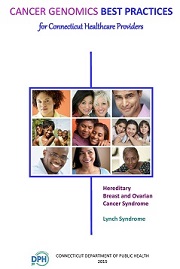Welcome to the DPH Office of Genomics
Genomics is an exciting field for public health because of the possibilities it holds for preventing disease and improving health. Genomic discoveries will continue to play an increasing role in disease prevention, detection, and treatment.
The Public Health Genomics Office (DPH-GO) strives to integrate developing genomic technologies into public health policy, programs, and practice. The Office also serves as a resource for health professionals and the public about the role of genomics in disease prevention and health improvement.
Since 2014, the DPH-GO Cancer Genomics Project has been supported in part by cooperative agreement #93.283, funded by the Centers for Disease Control and Prevention, to advance cancer genomics best practices through education, surveillance, and policy efforts.
March is Colorectal Cancer Awareness Month
National Lynch Syndrome Awareness
Lynch Syndrome (LS) is a hereditary condition that increases a person's risk for developing colorectal, endometrial, and several other cancers before age 50. Learn more about Lynch syndrome and ways to lower your risk for colorectal cancer today.
Close biological relatives of persons with Lynch syndrome have a 50% of having LS too. If you have Lynch syndrome, learn how to talk about it with your family.
April 25th is National DNA Day!
National DNA Day commemorates the successful completion of the Human Genome Project in 2003 and the discovery of DNA's double helix in 1953. National Human Genome Research Institute (NHGRI) began celebrating DNA Day annually on April 25th after the 108th Congress passed concurrent resolutions designating it as DNA Day. The goal of National DNA Day is to offer students, teachers and the public an opportunity to learn about and celebrate the latest advances in genomic research and explore how those advances might impact their lives.
Join the celebration:
- Find events near you: https://www.genome.gov/27563857/find-events/
- CDC Public Health Genomics
- U.S National Library of Medicine
October is National Breast Cancer Awareness Month
Did you know that your family health history may place you at high risk for breast cancer?
Know:BRCA helps you to gather important information on your breast cancer family history.
Five to ten percent of all breast cancers are hereditary.
Learn more about Hereditary Breast and Ovarian Cancer (HBOC) syndrome:
Information for Patients and Their Families - Hereditary Breast and Ovarian Cancer Syndrome
Síndrome de cancer hereditario de mama y de ovario
Thanksgiving Day is Family Health History Day
El Día de Acción de Gracias es también el día de historia familiar
It's Thanksgiving Day, and you and your family are gathered around the dinner table enjoying conversation and a delicious home-cooked Thanksgiving meal. As you reminisce with relatives about fond times and create new ones for future memories, you might also learn some valuable information that could help you to lead a healthier life.
Learn more about family health history and chronic diseases this November.
My Family Health Portrait - a tool from the U.S. Surgeon General
Family Health History Pocket Guide (PDF 1MB)
Este Día de Acción de Gracias, tome la oportunidad para aprender mas sobre el historial de salud familiar y su importancia.
Recursos informativos
Medline Plus: Historia familiar
U.S. Surgeon General: El Retrato de mi Salud Familiar
Additional Centers for Disease Control and Prevention resources:
CDC Breast Cancer Facebook page
CDC Breast Cancer on Pinterest
Share Your Story web app for breast cancer survivors, previvors, supporters or caregivers to create shareable content for their own personal experiences with breast cancer.
Did you know that breast cancer is the most common cancer in Connecticut women?
Learn more about breast cancer in Connecticut:
Connecticut Tumor Registry - Breast Cancer in Connecticut Fact Sheet
Centers for Disease Control & Prevention and the National Cancer Institute - State Cancer Profiles
The Connecticut Breast and Cervical Cancer Early Detection and Prevention Program
A recording of Harry Potter and the Genetics of Wizarding , the 2016 DNA Day lecture sponsored by the National Human Genome Research Institute, is available for viewing online. This presentation uses knowledge of popular culture as a platform for understanding genetic inheritance.
Updated list of Cancer Genetic Counselors in Connecticut
Click here for information on Genetic Counselor Licensing in Connecticut

The Cancer Genomics Best Practices for Connecticut Healthcare Providers(2015) includes:
- Information for providers, patients, and their families about Hereditary Breast and Ovarian Cancer (HBOC) Syndrome and Lynch Syndrome (LS), formerly called Hereditary Non-Polyposis Colorectal Cancer Syndrome);
- Evidenced-based guidelines related to HBOC (due to BRCA mutations) and LS;
- Statewide data generated by the Connecticut Tumor Registry on cancers diagnosed in patients who may be at increased risk for HBOC or Lynch Syndrome;
- A list of cancer genetic counselors in Connecticut.
Download the complete, hyperlinked version of the booklet: Full Version
Download specific materials included in the booklet:
Information for Patients and Their Families - Hereditary Breast and Ovarian Cancer Syndrome
Síndrome de cancer hereditario de mama y de ovario
Information for Patients and Their Families - Lynch Syndrome
Your opinion is important!
Healthcare Provider Feedback Survey
General Public Feedback Survey
Your feedback about this publication will help us to better understand the information needs of people interested in cancer genomics. Please send your comments and/or questions about this publication, Cancer Genomics Best Practices for Connecticut Healthcare Providers (2015) to: DPH.Genomics@ct.gov.
The Genetic Information Nondiscrimination Act
The Genetic Information Nondiscrimination Act (GINA), is the first federal legislation to provide protections against discrimination based on an individual's genetic information in health insurance coverage and employment settings. The resource, "What Does GINA Mean? A Guide to the Genetic Information Nondiscrimination Act ," summarizes the protections of this civil rights legislation and outlines its impact on the future of health in America.

